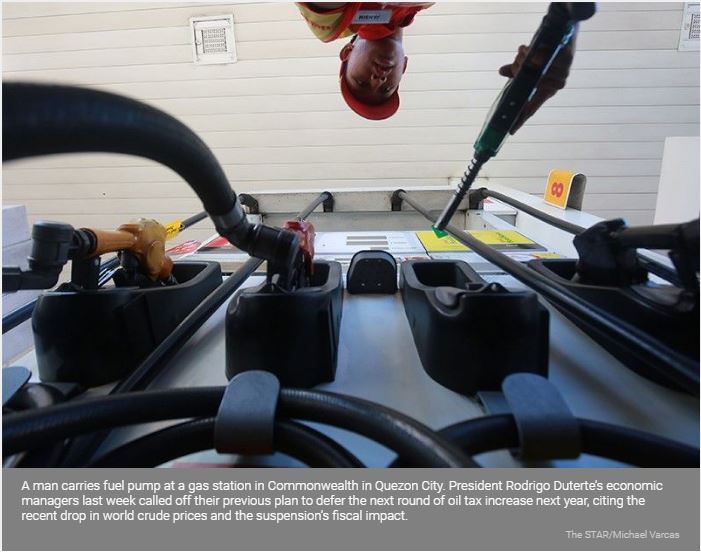Philippines – Diokno: Fuel tax hike no threat to 2019 inflation target
MANILA, Philippines — The government’s inflation target for next year would not be affected by the further hike in excise tax on fuel products scheduled to be levied in January, Budget Secretary Benjamin Diokno said Wednesday.
President Rodrigo Duterte’s economic managers last week called off their previous plan to defer the next round of oil tax increase next year, citing the recent drop in world crude prices and the suspension’s fiscal impact.
During a Cabinet meeting Tuesday night, Duterte gave the go signal to proceed with the fuel tax hike.
At a press conference, Diokno said the Bangko Sentral ng Pilipinas assured the economic managers that imposing additional petroleum taxes won’t threaten the government’s 2-4 percent inflation target next year.
“As you know the BSP is a member of the [Development Budget Coordination Committee] and before we proposed this and asked them the impact on inflation and they are very optimistic that this will not change their forecast,” the Budget chief said.
“Our forecast for next year is 2-4 percent. We stick by that,” he added.
Under the Tax Reform for Acceleration and Inclusion Act, or TRAIN law, the increases in petroleum taxes will be automatically suspended should average price of Dubai crude — used as benchmark for Asia — reach $80 per barrel for three consecutive months before the next round of tax hike.
In making the recommendation to the president, the DBCC said it took into consideration the suspension’s adverse impact on government revenues and expenditures, as well as the “favorable outlook in world oil prices.”
“Dubai crude oil prices have gone down by 14 percent from an average of $79 per barrel in October down to $68 per barrel so far in November,” the DBCC said.
Expectations
Philippine consumers reeling from soaring prices finally got their much-awaited reprieve in November, which saw a softer inflation print of 6 percent on the back of slower price increments for food and tumbling oil prices.
With inflation seen abating moving forward, some analysts said the BSP can now afford to end its tightening cycle and eventually begin to loosen policy. The BSP has delivered rapid-fire interest rate hikes of 1.75 percentage points since May, among the most aggressive increases in Asia.
A central bank official recently said the BSP is now likely to lower its inflation forecasts at its meeting on December 13. Policymakers’ previous forecast was for inflation to average 3.5 percent in 2019 and 3.3 percent in 2020.
But in a market commentary, HSBC Global Research economist Noelan Arbis said the central bank may lift key rates by a modest 25 basis points in the first quarter of 2018 in response to the oil tax increases in January.
Arbis said the second tranche of fuel tax hike “poses the risk of stoking further inflationary pressures and higher inflation expectations” similar to the first tranche introduced in January this year.
“Managing inflation expectations, however, is crucial. We ask the business sector to avoid any unwarranted price increases as experienced during the rollout of the first tranche of fuel excise tax increase,” the country’s economic managers said in a joint statement on Wednesday.
“But we urge the public to be on the lookout and report any profiteering activities. We assure everyone that we will follow through with our efforts to maintain price stability and raise the quality of life of every Filipino,” it added. — Ian Nicolas Cigaral
Source: https://www.philstar.com/business/2018/12/05/1874446/diokno-fuel-tax-hike-no-threat-2019-inflation-target#07DUA7wFOVLiaDC8.99


 English
English




